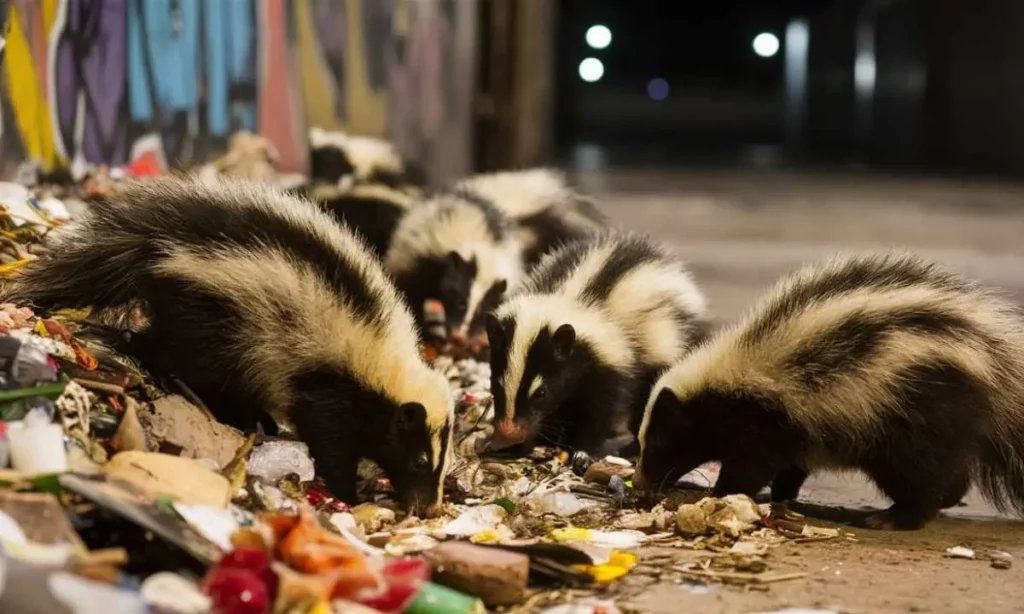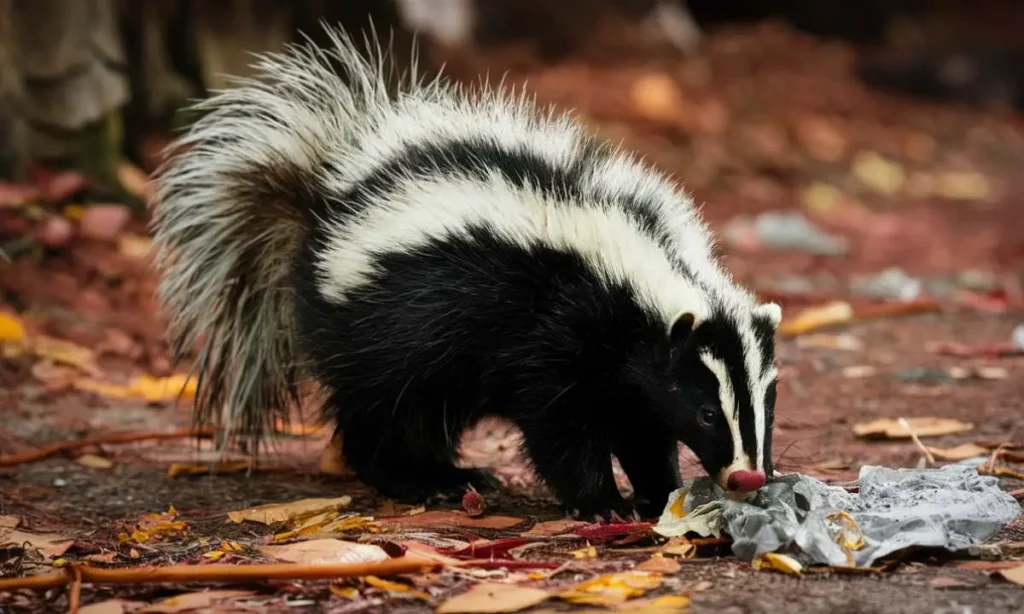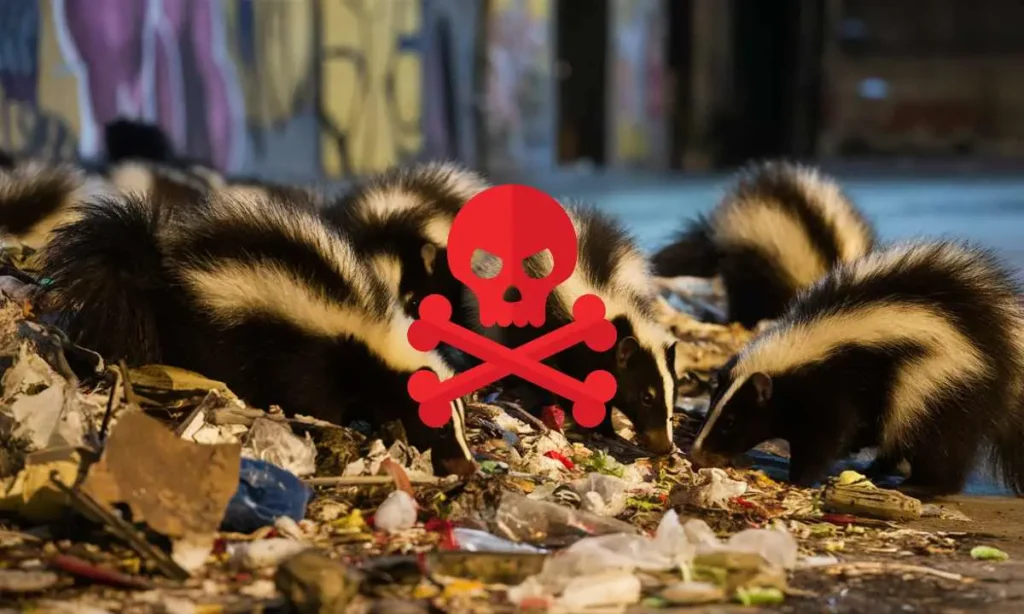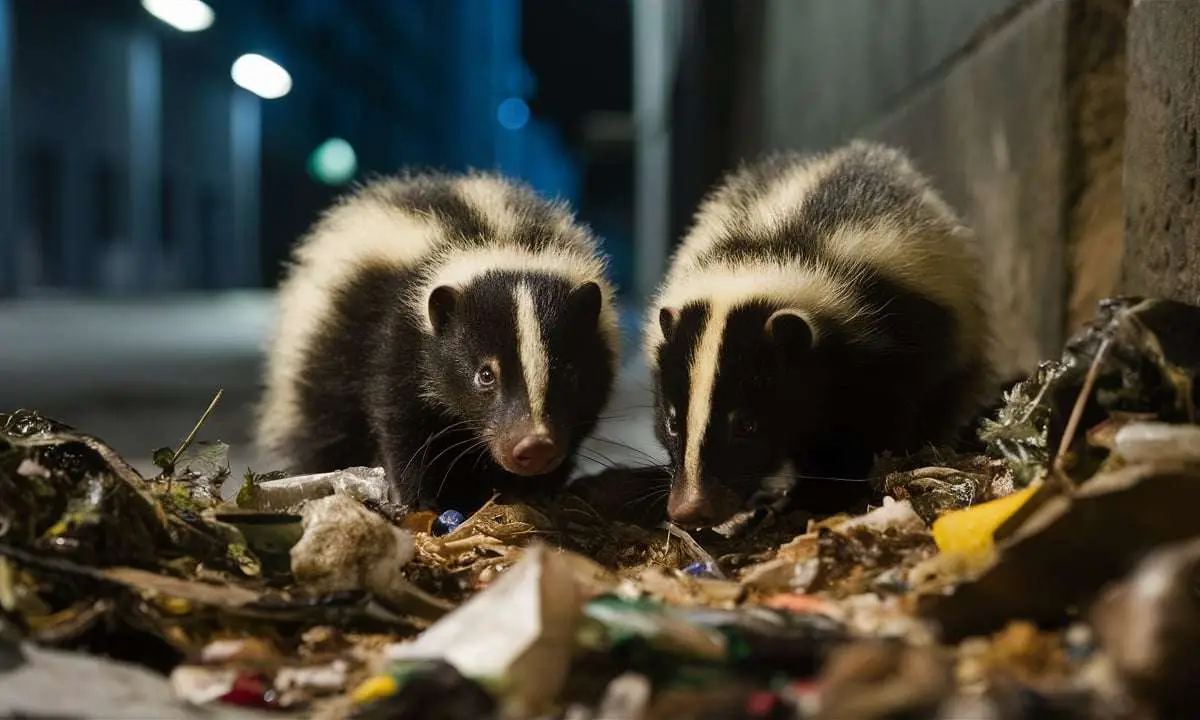Do Skunks Eat Garbage? Health Issues
Last updated on September 30th, 2024 at 03:33 am
Yes, skunks will eat garbage if there’s no other food available. In my time as a skunk pet owner and wildlife researcher, I’ve observed skunks scavenging through trash bins for leftovers. These nocturnal creatures will go for the easiest food they can find, often causing problems in suburban areas. Interested in learning more about skunks and how to keep them away from your garbage? Keep reading!
Skunks And Garbage

Skunks are small, furry animals known for their strong odor. Many people wonder if skunks eat garbage. The answer is yes, they do. Skunks and garbage have a unique relationship. Let’s dive into why skunks are attracted to garbage and the risks involved.
Skunks’ Attraction To Garbage
Skunks are always on the hunt for food. Garbage provides an easy meal for them. Here’s why:
- Garbage is easy to find. It’s often left outside, making it accessible.
- It contains food scraps. Skunks love leftovers, especially fruits and meats.
- Garbage smells strong. This attracts skunks, who have a keen sense of smell.
Let’s look at a table showing what attracts skunks to garbage:
| Reason | Explanation |
|---|---|
| Easy Access | Garbage is often not secured, making it easy for skunks to access. |
| Food Variety | Garbage provides a range of food options, from fruits to meats. |
| Strong Smell | Skunks are drawn to the strong odors from garbage. |
Skunks find garbage irresistible due to its easy access, variety of food, and strong smell.
Risks Of Skunks Feeding On Garbage
While skunks find garbage appealing, it poses risks. Here are some:
- Health hazards. Garbage can contain harmful bacteria and chemicals.
- Attracts more skunks. One skunk can lead to many, causing issues.
- Potential for conflict. Skunks might encounter pets or humans, leading to spraying.
Consider the following table for an overview of the risks:
| Risk | Detail |
|---|---|
| Health Hazards | Garbage can make skunks sick due to bacteria and chemicals. |
| More Skunks | One skunk can attract more, increasing the chances of conflict. |
| Conflict Potential | Encounters with pets or humans can lead to skunks spraying. |
Feeding on garbage poses significant risks for skunks, including health hazards, attracting more skunks, and potential conflicts with pets and humans.
Preventing Skunks From Eating Garbage

Skunks are known for their distinctive black and white coloring and their ability to spray a strong, unpleasant scent as a defense mechanism. While these creatures are mostly harmless, they can become a nuisance if they start to rummage through your garbage. Preventing skunks from eating garbage is important not only for your convenience but also to ensure the skunks don’t rely on human waste for food. Effective strategies can keep these critters away and maintain a clean and odor-free environment around your home.
Secure Garbage Disposal Methods
To keep skunks from turning your trash into a feast, consider these secure garbage disposal methods:
- Use sturdy trash cans with locking lids to prevent skunks from gaining access to the contents inside.
- Place cans in a shed or garage until the morning of trash pickup, reducing the time they are out in the open.
- Double-bag any food waste to mask appealing smells that might attract skunks.
Another aspect of secure disposal involves the schedule and placement of your trash:
| Strategy | Description |
|---|---|
| Timing of disposal | Dispose of garbage close to collection times to minimize the window of opportunity for skunks. |
| Location | Keep bins away from wooded areas where skunks might live and instead place them in well-lit, open spaces. |
Natural Deterrents For Skunks
Natural deterrents can be just as effective without harming the skunks or the environment:
- Install motion-activated lights to startle and scare away nocturnal skunks.
- Use natural repellents like citrus peels or ammonia-soaked rags placed near garbage areas.
- Maintain a clean yard by removing food sources like fallen fruit which may attract skunks.
Creating a barrier can also help:
| Natural Barrier | Effectiveness |
|---|---|
| Gravel or rock | Skunks dislike walking on these surfaces, so lining your garbage area with them can deter entry. |
| Fencing | Installing a fence that is buried a foot underground can prevent skunks from digging underneath. |
By combining these methods, you create a multi-layered approach to keep skunks at bay and your garbage secure.
Environmental Impact

Skunks are known for their distinctive black and white fur and their ability to spray a foul-smelling liquid as a defense mechanism. But what about their diet? Yes, skunks do eat garbage, and this behavior can have a significant environmental impact. As these creatures adapt to human environments, they often rummage through trash cans in search of food, which can affect both local ecosystems and waste management practices.
Effects Of Skunk Feeding Habits On Ecosystem
When skunks forage through garbage, the balance of the ecosystem can be disturbed. Here’s how:
- Skunks may reduce the population of certain pests, but they also compete with native predators for food.
- Leftover trash can attract other wildlife, leading to unhealthy interactions between animals.
- Discarded waste can become a source of pollution as skunks scatter garbage, which can affect plant life and water sources.
Let’s delve deeper into some key points:
| Aspect | Impact |
|---|---|
| Predator-Prey Dynamics | Altered due to skunks consuming easy-to-access garbage over natural prey. |
| Disease Transmission | Increased risk as skunks may carry diseases picked up from garbage into human spaces. |
| Plant Growth | Affected by waste pollution, potentially harming native vegetation. |
These aspects show that skunk feeding habits on garbage can lead to a domino effect within the ecosystem.
Waste Management And Wildlife Conservation
Effective waste management is crucial in minimizing the impact of skunks on the environment. Here’s what can be done:
- Secure trash bins to prevent skunks from accessing garbage.
- Compost organic waste to reduce the amount of food waste in trash cans.
- Implement community education programs to raise awareness about wildlife habits and waste disposal.
These strategies can help in wildlife conservation efforts:
- Reducing human-wildlife conflicts by limiting food sources that attract skunks to residential areas.
- Protecting native species by preventing skunks from becoming overpopulated due to easy access to food.
- Ensuring a cleaner environment by reducing the spread of waste caused by skunk scavenging.
Proper waste management practices are not only good for the environment but also for the well-being of all species involved.
Frequently Asked Questions
Are Skunks Attracted To Garbage?
Yes, skunks are attracted to garbage as it offers them easy access to food. Secure trash bins to deter them.
What Do Skunks Hate The Most?
Skunks strongly dislike certain smells, particularly citrus, ammonia, mothballs, and predator urine like that of dogs. These odors can deter skunks from an area.
What Do Skunks Like To Eat The Most?
Skunks primarily enjoy a diet of insects and grubs. They also eat fruits, nuts, and small mammals for variety.
Conclusion
Skunks certainly aren’t picky eaters, and yes, they will rummage through garbage. Protecting your trash can deter these nocturnal foragers. Remember, maintaining cleanliness is key. By securing your waste, you minimize skunk visits and keep your surroundings odor-free and harmonious.
Let’s respect our wildlife neighbors by being vigilant with our waste management.

